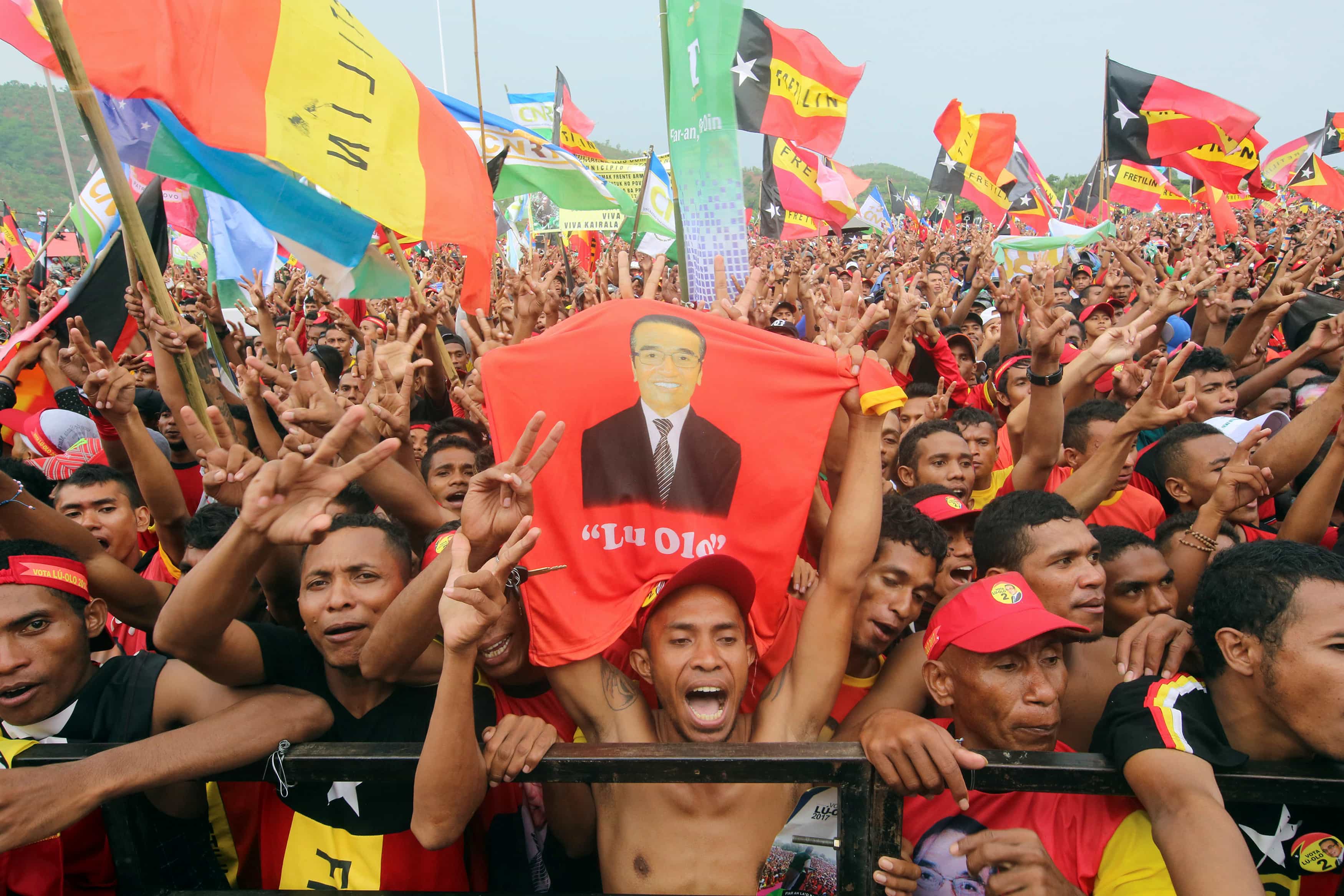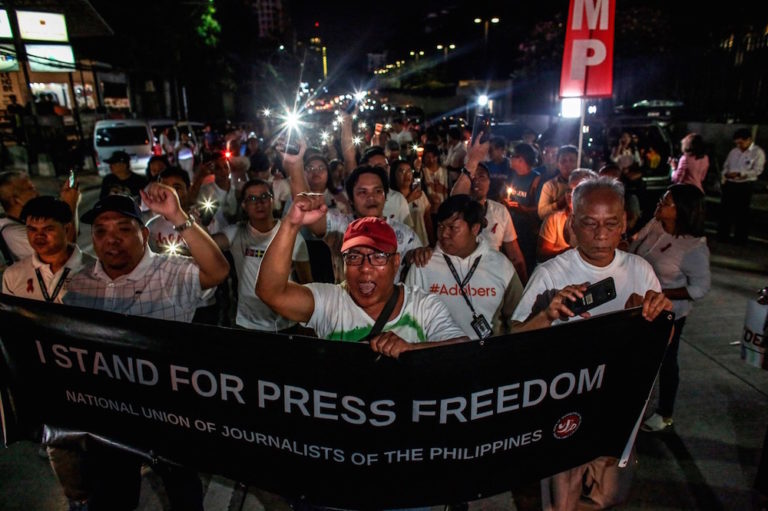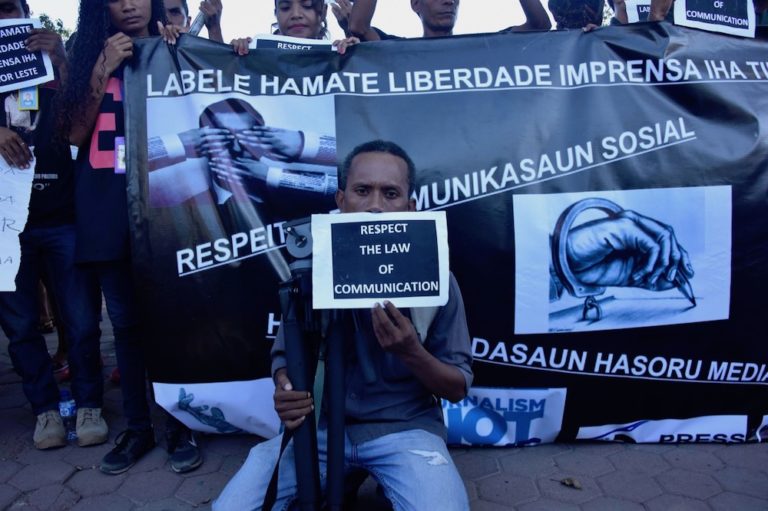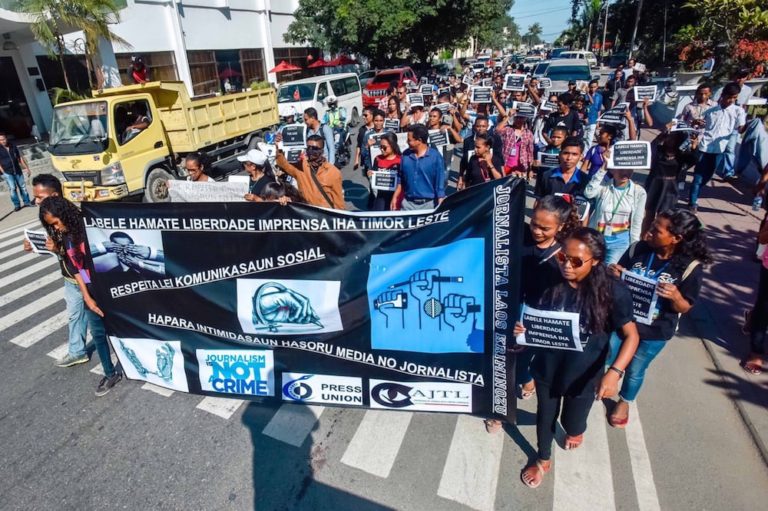As Timor-Leste conducts its fourth regular national elections, the country's free but resource-poor media is challenged to provide a fair coverage of an increasingly complex political context.
This statement was originally published on seapa.org on 17 March 2017.
As Timor-Leste conducts its fourth regular national elections beginning Monday, March 20, 2017 the country’s free but resource-poor media is challenged to provide a fair coverage of an increasingly complex political context.
The Timor Leste Journalists Association (TLJA), State Secretary of Social Communication (SECOM), and Southeast Asian Press Alliance (SEAPA) organized a town hall meeting in January 2017 to discuss the role of the media in safeguarding the conduct of the polls and more importantly, in ensuring that citizens make informed choices on March 20 presidential elections and July 20 parliamentary elections.
Media organizations and political parties were complaining about election preparations and procedures, which were unnecessarily slow and tedious. The elections will not only demonstrate the country’s stability and the legacy of the independence movement, but will also test the capacity of its democratic institutions, particularly the media.
Media as venues for interaction
Much like the experience in other developing democracies, the Timor-Leste media community have to deal with limited resources and training in covering key political junctures.
Press Council Commissioner Hugo Fernandez said that most of the media outlets do not have enough means to cover all political parties. Some media houses have very few staff – especially online media outlets, which mostly have one or two journalists that cover everything.
Despite the community and stakeholders’ acknowledgment that the media provide the platforms for interaction, Fernandez shared that it was hard for media organizations and journalists to deliver “accurate and balanced” news.
“If ‘balanced’ means equal reporting on the 32 political parties, (then) how can a small organization with a few staff cover (them all),” said TLJA president Hugo David.
Given a limited number of reporters and an expansive campaign ground, voters are left with inadequate information on parties, candidates, and governance programs. Observers noted that the 15-day campaign period was too short and tend to favor big political parties, which can quickly mobilize and gather media attention.
“It is also the media’s job to go and dig out election promises from small political parties. Even if there are no obvious political campaign activities, given some of the parties may not have enough resources, reporters must still reach out to them and ask questions,” said one of the reporters who attended the town hall meeting.
According to David, TLJA recognizes the need for the media to level the playing field and provide equal opportunities for parties and candidates – whether big or small, popular or not, incumbent or challenger – to present their programs and plans to the public.
East Timor publishes seven newspapers, which include five dailies and two weeklies. The privately-owned print media have relatively limited readership and reach. The state buys some of these copies and distributes within bureaus and agencies to help support the industry.
The scope of news coverage in newspapers has broadened over the years with more features on economy, entertainment and lifestyle. Most sources of news come from the government, thus providing less voices to alternative and critical views.
There is a public television and radio broadcast, and another 25 are commercial and community stations spread across the country. There are a few FM radio stations offering more independent and diverse content. In recent years, the number of stations operated by civil society groups have been dwindling due to shrinking advertisements and financial support from the aid development sector.
The ruling Fretilin invests in one television station and one radio station, while the second biggest party, the Council for Timorese Reconstruction (CNRT), owns a tabloid magazine.
Public television and radio stations could provide venues for interaction between the government and the citizens. But they too are faced with similar difficulties in resources and staff as their private counterparts.
Online media grew significantly over the years to fill the information gap, particularly the younger generation. But low internet penetration at 27 percent has restricted the online media reach.
The cost of internet remains to be one of the most expensive in the world. At an average of US$50 and US$200 per month for mobile and landline connections, respectively, the internet remains out of reach for the people, about half of whom live in in extreme poverty.
As a cheap platform, contesting parties have used the online space and mobile technology to propagate their policies and platforms. The government has expressed concerns over the proliferation of “negative” reports and “sensitive” content online and is considering measures to regulate this vibrant platform.
Major and ruling parties such as Fretilin have more advantage since it owns radio and television stations, which can reach out to more voters in remote areas where internet access is limited due to poor infrastructure.
In remote areas, internet communication and transportation are especially difficult. Journalists can only use phones to report back to the office. Small media outlets might not be able to support the high cost of communication for their reporters.
At the request of the media community and civil society groups, the National Elections Commission (CNE) has set up a media center during the election period.
Other challenges and issues
Media owners were keen to invest more in more profitable content than the quality of news content. Journalists are poorly-paid and not well-equipped, logistically and professionally, to provide good quality reporting.
Representatives from the human rights sector see the need for journalists who cover the elections to learn how to detect vote rigging and other possible irregularities in the election process.
Prior to the election period, journalists protested the idea of a “registration” for media organizations and journalists to be able to cover the upcoming polls. They were wary that the measure and process would go against the Press Law, which protects the rights of the media to cover stories without any restriction.
The measure requires any media worker including the foreign press to register before they can cover the campaigns and elections by submitting formal request from their respective institutions for a special identification (ID) card. Only media with the special ID card would have been able to enter election areas.
The Press Law already requires all media workers to have media ID cards issued by the Press Council. The process, which includes a condition for new media workers to take a six-to-18-month apprentice period before a competency test, only began mid-2016. In the absence of regular media ID cards, the National Elections Commission (CNE) proposed that media workers have to register with for the special IDs.
Nélio Isaac Sarmento, Secretary of State for Social Communication (SECOM), explained that the registration was necessary to ensure the news coverage of the elections was free and fair. He mentioned that a growing number of media outlets – especially online – did not practice “good” journalism. He said that the measure would facilitate journalists, who cover the elections, by guaranteeing their access to information and safety.
However, Press Council Commissioner Fernandez responded that they would rather that the government guarantee media rights and provide equal treatment to all journalists. “Even if they do not have an ID card, everyone still has the right to cover the news,” he said.
Another major concern for the media community was a possible repeat of the violence in the 2007 elections among supporters and security forces of contending parties. Media workers, who are neither well-informed on the ground situation nor prepared for conflict reporting, could risk their safety. They might not be equipped to handle crisis situations, not only compromising their security but also the public’s right to know and information.
In view of this risk, participants in the town hall meeting raised the need for an agreement among police, military, politicians, and media to work together and guarantee media access to information and safety. As of press time, there was no update regarding this suggestion.
Weeks prior the national elections in East Timor, the media community and other stakeholders have raised concerns about conditions that limit their engagement in keeping the process free, fair, and participatory.
Background
East Timor held two presidential and legislative elections and one referendum since it gained independence 15 years ago. International observers said these were relatively free and fair, without violence except in the 2007 elections. The voters’ turnout was at least 75 percent in the last elections.
In previous polls, all political parties contested on peace and justice as their main agenda accommodating the priority issues of the majority of voters. Over the years, people’s expectations of what elections bring to their lives have changed from “stability and status quo” to “social and economic well-being.” Critics in the media have said the following issues will be the major campaign platforms: fighting against the growing corruption in government and the private sector as well as East Timor’s future as an oil-dependent economy.
A total of eight candidates will take part in the presidential elections. In the parliamentary elections, there are two dominant political parties, Fretilin and CNRT, as well as some small parties including the progressive and popular People’s Liberation Party – which projects itself as a strong critic of the ruling government’s economic policy – have emerged to challenge the political status quo. The contest has a total of 32 parties, a huge growth from the 19 parties in the 2012 elections. For the first time, overseas East Timorese will be allowed to vote in the elections.
The press freedom ranking of the country is relatively high compared to others in the region, thanks to a favorable political and legal environment and the fact there are no major violations of media rights.
However, Timor Leste’s criminal defamation law remains a threat to muzzle the critical press. Friction is growing between the media and the state as the former attempt to scrutinize corruption in the government and business sectors.
In January 2016, Timor Post journalists Raimundos Oki and Lourenco Vicente Martins were slapped with a criminal defamation lawsuit. Prime Minister Rui Maria de Araujo sued the journalists for their November 2015 reports, alleging the high official’s involvement in an irregularity in a government bidding contract on a computerization project. At the time of the bidding, Araujo served as an advisor to the Minister of Finance in 2014. The lawsuit is significant as it comes from the country’s highest ranking government official that sets an example to other government officials and influential people to use criminal defamation charges to muzzle the media.
The lawsuit continues despite the newspaper’s publication of the Prime Minister’s clarification as his right of reply, and the resignation of Martins as an editor. Oki and Martins could face up to three years imprisonment under Section 285 (1) of the Penal Code.
The 2002 Constitution contains strong guarantees to protect press freedom and freedom of expression, including a provision to protect the media from political and economic influence (Sections 40, 41). While having an intention to protect media rights, the Press Law of 2014 has some aspects that could restrict journalism practice, primarily the potential abuse of the power of the Press Council to issue ID cards and require apprenticeship before being able to practice journalism. East Timor’s newly-established Press Council is mandated by law to protect press freedom and enforce media ethics with specific roles to mediate disputes between the media and the public.



